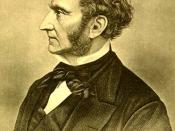Deontological ethics is too rigid in its emphasis on duties, utilitarian
ethics too keen to override basic human rights.
Deontology and utilitarianism are both types of ethics referring to how one
reacts in a certain situation. Deontology is based on following a set of duties and
sticking to these duties no matter what the consequences whereas utilitarianism is
based on choosing the best outcome over a short term and long term even if it means
depriving people of basic human rights for example. However does this mean that
deontological ethics is too rigid in its emphasis on duties and that utilitarian ethics is
too keen to override basic human rights?
According to a deontologist ones actions must be determined by a set of duties
regardless of whether the long term consequences are good or bad. A deontologist
believes in human morals and that every human has certain rights and these morals and
rights should not be betrayed no matter what the cost for example sacrificing one life
to save one hundred lives would be unacceptable to the deontologist despite the fact
the consequences would be better overall.
The biggest problem with deontology is knowing which set of duties to follow,
there could be a great variation in systems between people from different backgrounds,
different social classes, different religions and people from different cultures. For
example a Protestant English Lord would have different morals and a different set of
duties than a lower class Indian Hindu. It is very difficult to tell which set of duties, if
any, is the right one.
Deontologists suffer many problems when their duties seem to conflict with
themselves or with other duties. One has a duty to save lives but what if in order to do
this one must betray another duty for example a...



Deontological ethics is too rigid in its emphasis on duties, utilitarian ethics too keen to override basic human rights
The essay is about deontological ethics, and it describes many of the ethical dilemas involved.
2 out of 2 people found this comment useful.